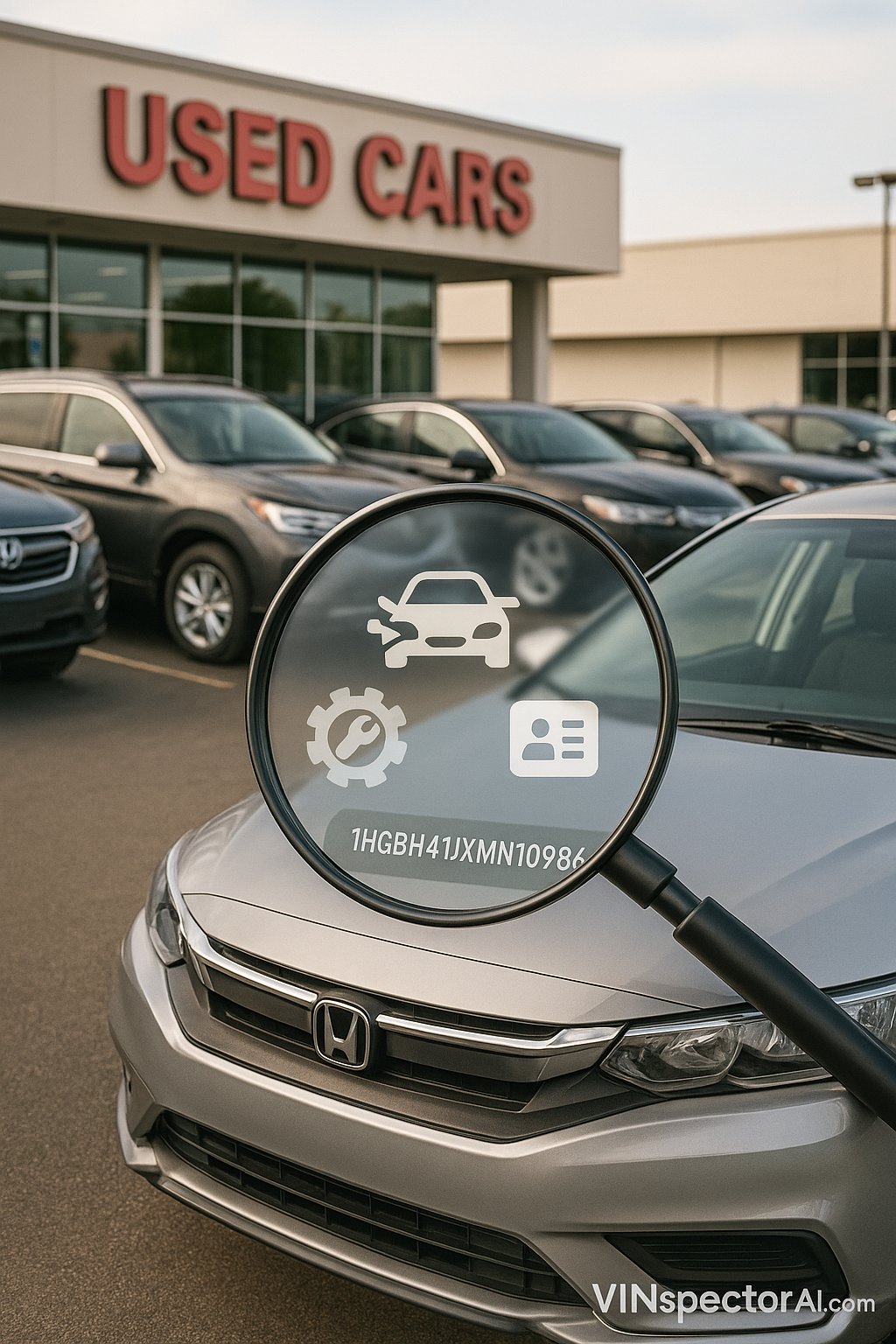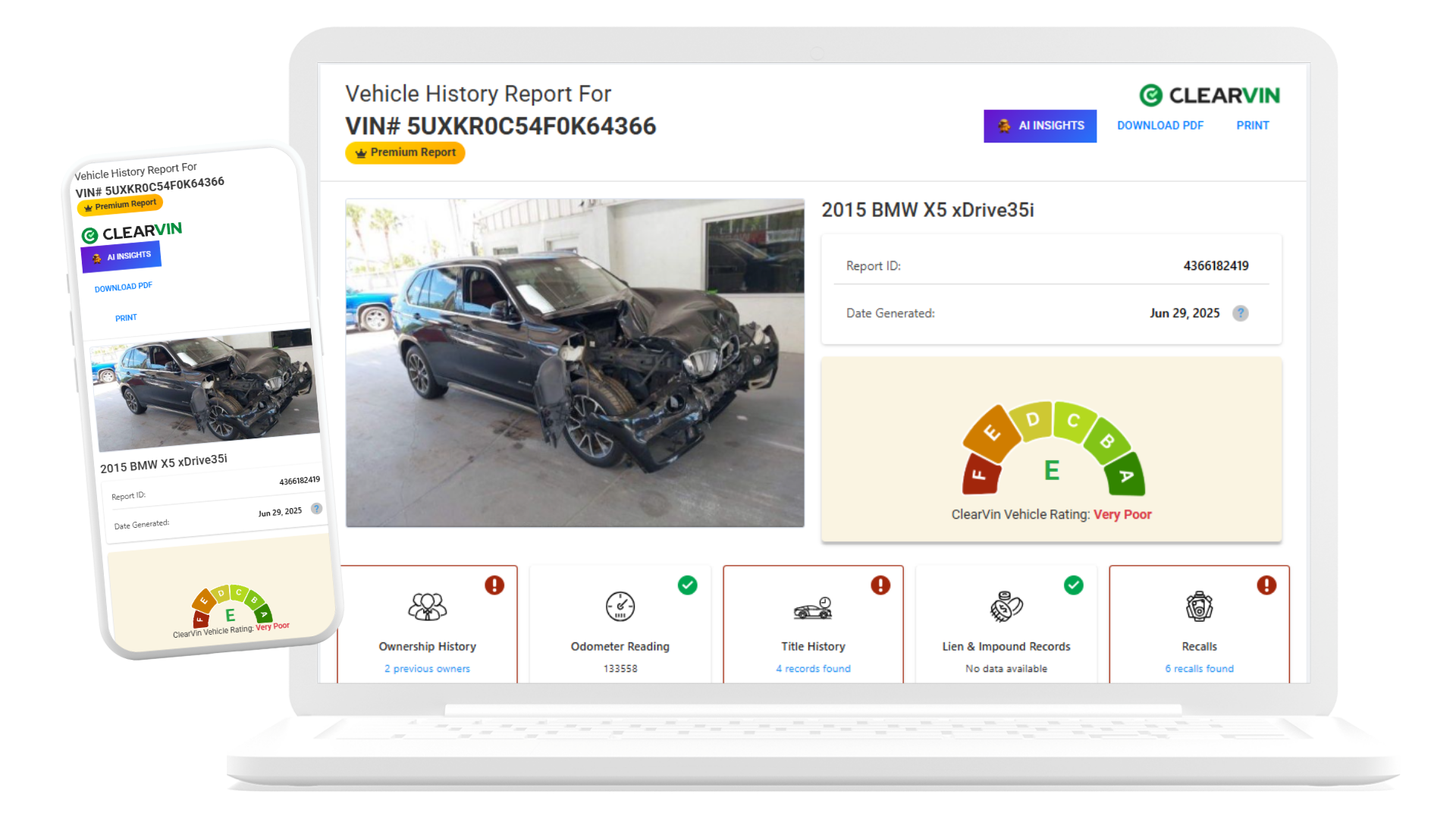
Detailed VIN Reports for Used Cars: Full History Guide
Buying a used car in the United States feels risky if you don't know the vehicle's full story. A detailed VIN report brings up crucial info about a car's past—accidents, title messes, flood damage, maintenance records, you name it. That stuff could save buyers thousands.
This 17-character vehicle identification number? It's like a key that unlocks a car's real background, not just what a seller wants to talk about.

Plenty of folks rely on visual inspections and whatever the seller claims. But let's be honest, hidden issues—like old accidents, odometer rollbacks, or even lemon status—are easy to miss if you don't know what to look for.
NHTSA's VIN lookup tool gives recall info, while other services dig up accident histories, title records, and ownership changes.
Buyers who do their homework with a thorough VIN check usually dodge expensive surprises. These reports pull together data from insurance companies, DMVs, police, even auction houses. That way, you get the full picture—warts and all.
Key Takeaways
VIN reports uncover hidden problems you just can't spot with your eyes
Good reports pull info from all over—insurance, cops, DMVs, the works
Spending a little on a detailed VIN check can save you a whole lot more down the line
What Is a Detailed VIN Report and Why It Matters

A detailed VIN report uses that unique number to dig up accident history, title problems, and any safety recalls. Getting this info helps buyers avoid costly mistakes and figure out if the price is fair.
Key Information Included in a Detailed VIN Report
A detailed VIN report is really like a car's fingerprint—showing you what you actually need to know before handing over cash.
Title and ownership history tells you how many owners there've been and where the car lived. If you see salvage, flood, or lemon brands, that's a red flag for value.
Accident records break down any crashes reported to insurance or cops. These usually note how bad the damage was and if airbags deployed.
Odometer rollback info helps spot mileage fraud. The report lines up odometer readings from different sources, so you can catch anything fishy.
Flood damage pops up if the car's been in hurricanes, floods, or heavy water. Water damage can haunt a car for years—especially with electronics.
Safety recalls from NHTSA show if the manufacturer called the car back to fix something dangerous. You'll see if those fixes actually got done or not.
Service and maintenance records shine a light on how well the car's been looked after. Regular oil changes and tune-ups? That's a good sign for reliability.
How VIN Checks Protect Used Car Buyers
VIN checks warn buyers about hidden problems before they buy, by pulling in records from DMVs, insurance, and repair shops.
Financial protection means you can steer clear of cars with hidden damage or sketchy titles. Nobody wants a money pit or a car that's impossible to sell later.
Safety protection is about knowing if there are any open recalls that could cause a crash. NHTSA says manufacturers have to fix those for free.
Legal protection helps you avoid buying a stolen car or one tangled up in legal drama. Clean titles make for smooth ownership transfers.
Free vin check services give you some basics for nothing, but paid reports dig deeper. Start free if you're just browsing, but it's worth paying for the full story on pricier cars.
Negotiation power comes when you know the car's real history. If a report shows an accident or something the seller didn't mention, you've got leverage to ask for a better price.
The Importance of Vehicle History in the USA
NMVTIS database is the main source for vehicle history in all 50 states. This federal database helps stop title fraud and flag problem cars moving from state to state.
Market value accuracy really depends on knowing the full history. Cars with accident records or title brands usually sell for way less—sometimes 10-20% below clean cars.
Insurance implications can hit your wallet too. Insurers often charge more for cars with damage history, or they might flat-out refuse to cover some title brands.
State regulations are all over the place. What counts as flood damage in Florida might be different in California.
Used car market trends show that clean-history cars sell faster and hold their value longer. Vehicle history reports are now a must-have for smart buyers.
Consumer protection laws make dealers disclose known history issues in lots of states. Private sellers? Not so much. That's why independent VIN checks matter even more.
Understanding and Using VIN Reports for Used Cars in the USA

VIN reports tell you about the car's past—accidents, title issues, maintenance, and more. They help you spot stuff like odometer rollbacks, title washing, and hidden damage before you buy.
How to Obtain and Read a Detailed VIN Report
Getting a VIN report isn't hard. Plenty of sites offer a free VIN check for the basics, but if you want the good stuff, expect to pay $20–$40.
You can find the 17-character VIN on the dashboard, the driver's door jamb, or the title. A VIN decoder gives you manufacturing details—year, make, model, engine, all that.
Key sections in VIN reports include:
Title history and ownership changes
Accident and damage records
Service and maintenance records
Recall information
Odometer readings over time
Reports usually list info in order by date. Check that odometer numbers go up over time. If they drop or there are big gaps, that's a bad sign.
Key Red Flags to Watch For in Vehicle History Reports
Some warning signs should make you pause. Title washing happens when cars move between states to hide their damage past. Too many title transfers in a short time? That's suspicious.
Odometer discrepancies show up like this:
Mileage going backwards
Huge gaps between readings
Labels like "Exempt" or "Not Actual" on mileage
Damage indicators include:
Flood damage reports
Fire damage history
Multiple accident claims
Salvage, rebuilt, or lemon titles
Lien records mean someone still owes money on the car. Active liens make transferring ownership messy and might signal financial trouble.
Maintenance records show if the car's been cared for. High miles with no service records? That doesn't look good.
State and Federal Databases for VIN Checks
The National Highway Traffic Safety Administration runs federal databases for recalls and safety problems. Their VIN lookup gets you official manufacturer and recall info.
State DMV databases cover:
Title and registration history
Odometer readings from inspections
Lien details
Emission test results
Insurance companies feed claims data to big databases like CARFAX and AutoCheck. They pull info from salvage yards, repair shops, police reports, and more.
Federal databases track:
Safety recalls by manufacturer
Technical service bulletins
Crash test ratings
Theft records via NCIC
Some states limit what records you can see. California and Texas, for example, have their own rules. It's smart to check a few sources to get the full story.
Frequently Asked Questions

People have a lot of questions about what's in a VIN report, how to check if it's accurate, and how to get the most info for the least money. Honestly, knowing what shows up and how to read the warning signs makes buying a used car a whole lot less stressful.
What information can I expect to find in a detailed VIN report?
A detailed VIN report lists title issues, odometer readings, accident history, structural damage, liens, theft records, and manufacturer recalls. You also see past ownership and registration across different states.
Most reports flag flood damage and salvage titles. They'll let you know if the car was a rental, taxi, or fleet vehicle too.
If dealerships or repair shops share records, you'll find service history. Insurance claim data spells out the extent of any previous damage and repairs.
How can I verify the accuracy of a VIN report?
Vehicle history providers verify records against Federal and State databases and Department of Motor Vehicle records. They update the information as new data rolls in from government sources.
Try cross-referencing a few different report providers to catch any discrepancies. Each company pulls from its own set of data, so the details you get might not always line up perfectly.
Honestly, nothing beats a good old-fashioned physical inspection. Check for accident damage, flood signs, or odometer tampering—see if what you find matches up with the report.
Are there any free resources for obtaining a VIN report for a used car?
Free VIN checks give you some basic history without asking for credit cards or even a login. These sites tap into government and industry databases for the essentials.
The NHTSA VIN decoder digs up manufacturing details, safety recalls, and the basics on vehicle specs. It's a straightforward government tool, and honestly, it's pretty reliable for learning how the car rolled off the line.
NMVTIS-approved providers do offer more comprehensive reports, but you'll have to pay a fee. The Federal Trade Commission lists out the companies that can legally access the National Motor Vehicle Title Information System.
What are the key indicators of potential issues in a VIN report?
Title brands like "salvage," "flood," "lemon," or "rebuilt" jump out as red flags. These labels stick with the car forever and really drag down resale value.
If you see a bunch of different owners in a short span, that could be a warning sign. Cars that change hands a lot might have reliability issues or something just not quite right under the hood.
Odometer discrepancies or rollback warnings? That's usually someone trying to pull a fast one. Big gaps in mileage between inspections can mean trouble.
Accident reports that mention structural or frame damage are a big deal. Frame issues especially mess with a car's safety and how it handles a crash.
How does a VIN report help in determining the fair market value of a used car?
If a vehicle history report comes back clean, sellers usually ask for more money. Vehicle history reports create high value in the used car world by showing the car's real condition.
Title brands, on the other hand, tank market value no matter how nice the car looks now. Insurance companies and lenders often won't touch vehicles with certain titles.
Maintenance records can really boost a car's appeal, too. If the previous owner kept up with service and stuck with the dealer, it's a good sign the car got proper care.
Fleet or rental history? That usually means lower value because those cars get used hard. Commercial use just wears things out faster than private owners do.
Can a VIN report reveal the full ownership and service history of a vehicle?
VIN reports usually show registered owners, but they won't capture every single service appointment or maintenance event.
Lots of repair shops and dealerships just don't report all their work to central databases.
When individual owners handle maintenance themselves, that stuff almost never shows up in official records.
Oil changes or routine work done outside dealership networks? Yeah, those often go undocumented.
Insurance claims tend to offer the most complete accident history.
But if someone pays for minor repairs out of pocket, insurance databases won't pick that up.
State reporting requirements can vary a lot depending on where you are.
Don't let a car's past jeopardize your future. Take a crucial step toward a safe purchase and check the VIN of the vehicle you're interested in. Head over to VINspectorAI now and get a detailed report that gives you the peace of mind you need.
Uncover Complete Vehicle History Reports
Discover critical vehicle information before you buy. Our VIN decoder reveals accident records, title status, recalls, and service history to help you make informed decisions.
Related Articles
Explore Tags
More from Car Maintenance Tips

Avoid car buying scams with 5 proven tips. Spot fake sellers, check VIN history, verify documents, and use safe payments before buying your dream car.
